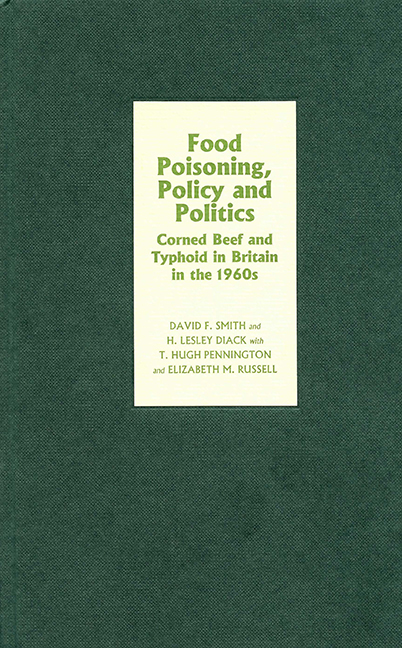Book contents
- Frontmatter
- Contents
- List of illustrations
- Preface and acknowledgements
- Abbreviations used in text
- Abbreviations used in footnotes
- 1 The earlier history of typhoid and food poisoning
- 2 The 1963 corned beef-associated typhoid outbreaks in Harlow, South Shields and Bedford
- 3 The Aberdeen typhoid outbreak
- 4 The medical officer of health, the media and the public in the Aberdeen typhoid outbreak
- 5 Ministers, officials and the Aberdeen typhoid outbreak
- 6 The Milne Committee of Enquiry
- 7 The recommendation on the inspection of overseas meat plants: the roles of existing policy agendas, and interdepartmental and inter-professional tensions
- 8 The disposal of suspect canned meat: the priority of politics over technical advice
- 9 British action to encourage improvements in Argentine meat hygiene, 1964 to 1969
- 10 Summary and conclusions, and food safety since 1964
- Appendix: Recommendations of the Milne Committee
- Bibliography
- Index
2 - The 1963 corned beef-associated typhoid outbreaks in Harlow, South Shields and Bedford
Published online by Cambridge University Press: 24 October 2017
- Frontmatter
- Contents
- List of illustrations
- Preface and acknowledgements
- Abbreviations used in text
- Abbreviations used in footnotes
- 1 The earlier history of typhoid and food poisoning
- 2 The 1963 corned beef-associated typhoid outbreaks in Harlow, South Shields and Bedford
- 3 The Aberdeen typhoid outbreak
- 4 The medical officer of health, the media and the public in the Aberdeen typhoid outbreak
- 5 Ministers, officials and the Aberdeen typhoid outbreak
- 6 The Milne Committee of Enquiry
- 7 The recommendation on the inspection of overseas meat plants: the roles of existing policy agendas, and interdepartmental and inter-professional tensions
- 8 The disposal of suspect canned meat: the priority of politics over technical advice
- 9 British action to encourage improvements in Argentine meat hygiene, 1964 to 1969
- 10 Summary and conclusions, and food safety since 1964
- Appendix: Recommendations of the Milne Committee
- Bibliography
- Index
Summary
Introduction
In Chapter 1, we learned that during 1949 in Crowthorne there had been an outbreak of typhoid that had been definitely connected with canned corned beef as the vehicle of infection, although it appears that no one thought at that time that the infection could have been in the can before opening. In 1955, however, the investigation that followed an outbreak of typhoid associated with tongue in Pickering suggested that canned meat could be contaminated during manufacture by impure cooling water entering the can through a temporary leak. In addition, in 1962, a published review of food poisoning in England and Wales made it clear that through accumulated experience of food poisoning associated with corned beef, expert opinion at the PHLS was convinced that the explanation offered for the 1955 outbreak was viable. The review even mentioned that several food poisoning incidents associated with corned beef had been found to involve produce from a single factory, and recommended that in such cases the hygiene of the factory concerned should be investigated.1 In this chapter, however, it will be shown through an examination of the archival records of MAFF that policy makers were slow to take decisive action when evidence began to accumulate of typhoid associated with the corned beef from a specific factory in Argentina which used unchlorinated cooling water. It will be argued that the tardiness of the response was largely the result of an overriding concern to take decisions in secret as far as possible. The wish to avoid publicity was not simply a matter of traditional civil service methods of operation. It also arose from a desire not to offend the Argentine government at a time of delicate negotiations that had been taking place regarding the regulation of the volume of Argentine chilled beef exports to Britain. It is therefore to the background history of the meat trade with Argentina that we will first turn.
- Type
- Chapter
- Information
- Food Poisoning, Policy and PoliticsCorned Beef and Typhoid in Britain in the 1960s, pp. 38 - 57Publisher: Boydell & BrewerPrint publication year: 2005



